From Spencer to Washburne: Elite Texas Prep School Incubates Euro-American Supremacy Across Generations
In 2016, I sat in the St. Mark’s newsroom as they deliberated on how to portray Richard Spencer: a neo-Nazi, the driving force behind alt-right political extremism… and a Class of ’97 alumnus. They called him ‘an outlier.’ Even back then, I knew it was a lie.
In the American imagination, private preparatory schools like St. Mark’s School of Texas project an image of genteel prestige and enlightened leadership.
They market themselves as intellectual bastions of ‘ethical young men’ destined to guide the nation and global order.
But behind the polished brochures and LinkedIn résumés lies an unbroken thread of supremacist ideology that stretches across generations.
This is the story of how one institution quietly fosters, normalizes, and exports the logic of racial hierarchy — long after it claimed to have moved beyond it.
[I] The Foundational DNA — Elite Homogeneity
Founded in 1906, St. Mark’s was conceived as a finishing school for Dallas’s wealthiest white families. Its legacy donors and board members are interwoven with:
- The Hunt oil dynasty, whose fortune was built on extraction and monopolistic leverage.
- Prominent old-guard families who shaped Texas’s social hierarchies.
- Political circles aligned with the most reactionary currents of American conservatism.
The school has always been, in essence, a grooming pipeline: a place where racial privilege, economic power, and intellectual elitism are fused into one.
[II] Richard Spencer: The 'One-Off' That Wasn’t
In the late 1990s, one alumnus quietly absorbed this environment. His name was Richard Spencer — now infamous as the figurehead of the Alt-Right, a movement that popularized white nationalism for a new generation.
When Spencer’s extremism became undeniable, St. Mark’s distanced itself with carefully curated statements:
... the “alumnus” leading the event was “bringing even greater attention to these hateful, divisive, racist, and anti-Semitic views. This has been deeply troubling and terribly upsetting to our whole school community.”
David Dini, Headmaster @ St. Mark's School of Texas
I distinctly remember how fervent the school’s administration was in crafting a meted response through the ReMarker newspaper: St. Mark’s publishing organization, and the manicured stage for their most direct denunciation of Spencer’s rise. At the time, I coincidentally held a leadership role in the newspaper as well (Graphics Editor), and so observed their meticulous spinning of the story for their own ends from a front-row seat. The administration insisted he was an aberration.
But this claim collapses under scrutiny.
Tracking the cognitive dissonance present in Euro-American Marksmen denouncing Spencer’s rhetoric, while also sustaining their own forms of racism and micro-aggressions, was an interesting juxtaposition to witness. Nonetheless, they managed to navigate the blowback without tarnishing the school’s reputation too irreparably. And yet, in a fitting fashion, history tends to repeat itself.
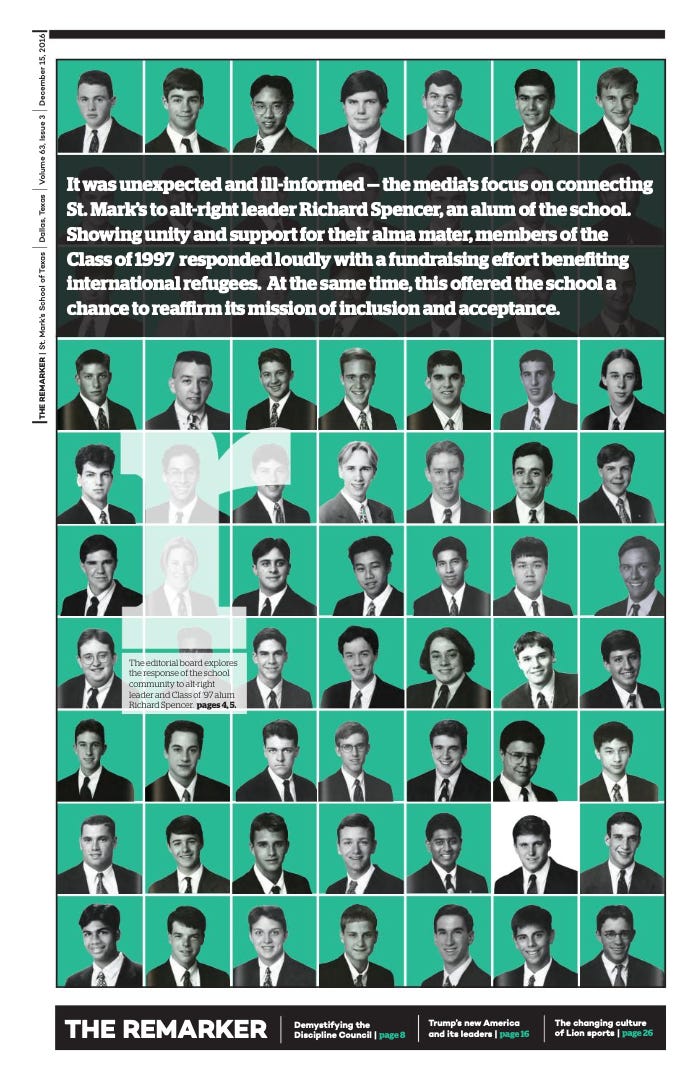
[III] Hill Washburne: The Next Iteration
Fast forward to 2020.
While attending Southern Methodist University, Hill Washburne — a descendant of the same Dallas aristocracy — posted a now-archived story on Instagram. In it, he challenged the Black Lives Matter movement with rhetoric centering religion and a “Darwinian view of human creation.” Furthermore, he underlined nature’s lack of equality as his proof that “equality is a right” has no basis. His tone and dogma dripped with a supposed moral necessity in selecting for superior bloodlines.
This was not an ironic meme. It was a plain admission of his baseline schools of thought: Christianity and Darwinist thinking — a philosophy that has always underpinned eugenics and colonial subjugation.
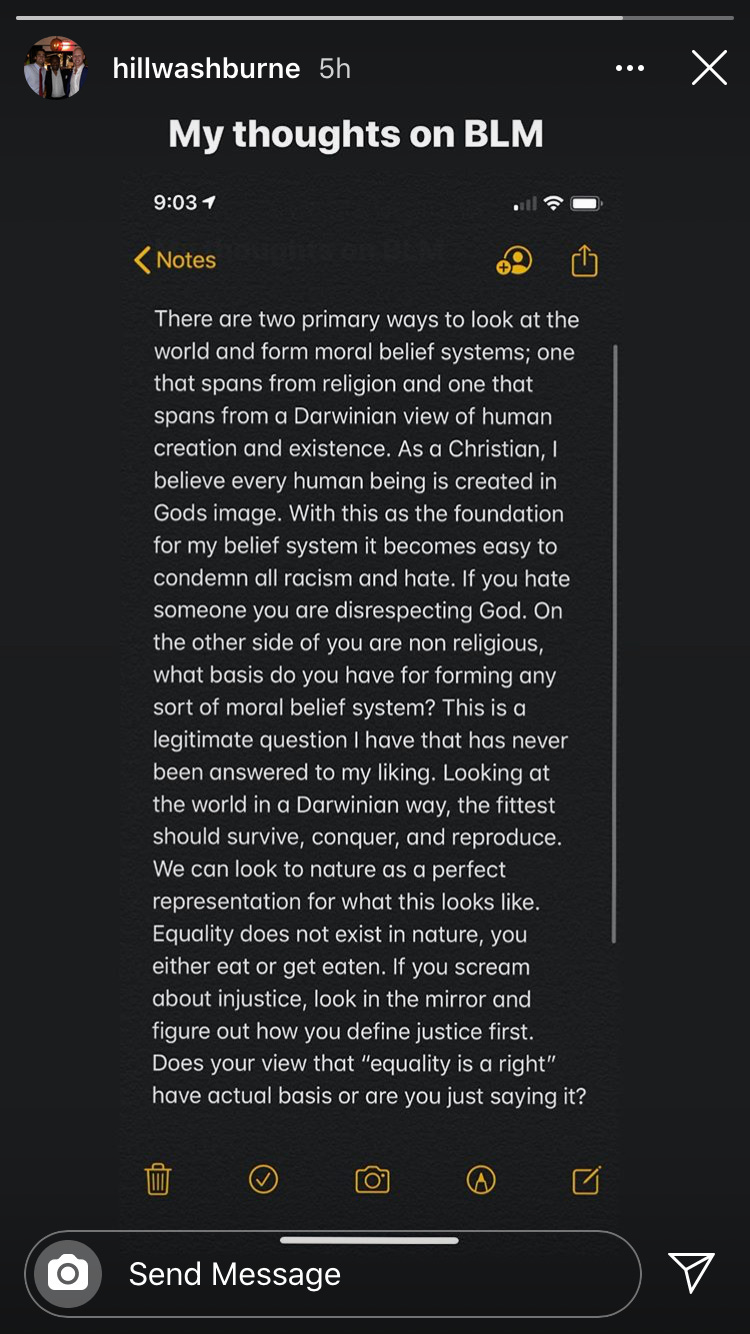
Hill’s peculiar Instagram story; posted in the wake of George Floyd’s murder.
[IV] Peter Thiel and the Technocratic Pipeline
Hill’s views don’t exist in in a vacuum, and they are far from isolated.
He and many of his ilk openly admire Peter Thiel, the Silicon Valley billionaire and CEO of Palantir who:
Funded far-right media ecosystems.
Embraced “heterodox” views on democracy and race.
Bankrolled candidates with white nationalist sympathies.
The connective tissue here is undeniable: the same school that produced Spencer also nurtured a class of young men who saw Thiel’s project as aspirational. When one tracks Hill’s post-grad career trajectory — JLL (real estate and development), Charter Holdings (private equity, owned by his father Ray), and then Palantir — we see a carefully curated corporate upbringing.
In the LinkedIn post below, note the ecosystem: Hill Washburne appearing in a Charter Holdings–led tour while a Palantir employee affirms the same post. These affiliations illustrate how interlocking networks of legacy wealth and surveillance technology normalize themselves as ‘best practices.’
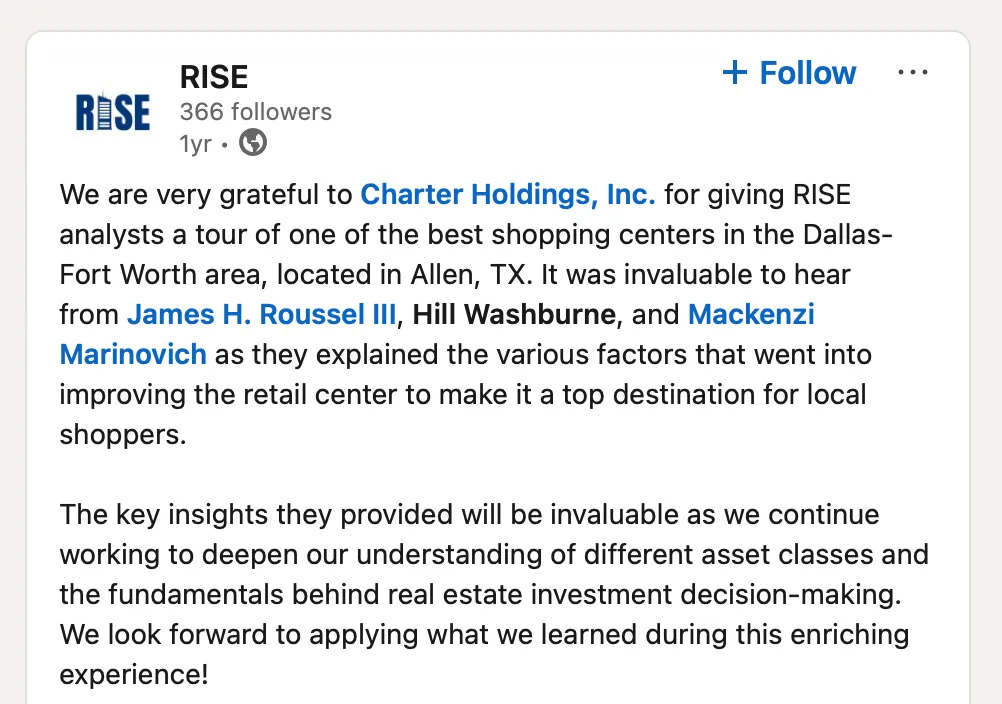
Documented affiliation // Hill Washburne, appearing as a Charter Holdings representative to brief analysts on retail investment strategy.
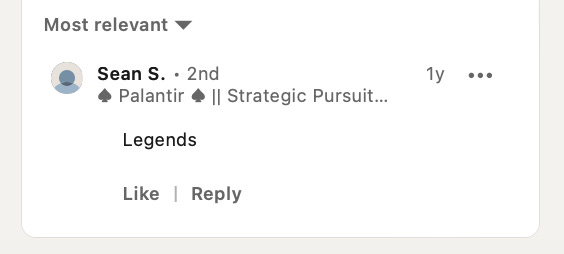
A Palantir employee offering praise in the comment section of the same post detailing Hill’s involvement in a Charter Holdings-led tour.
[V] The Hunt Dynasty: Financial and Ideological Fuel
Adding another layer, Hill Washburne is directly descended from the Hunt family — the dynastic lineage of H.L. Hunt, who made a fortune in the oil business and is the father of Kansas City Chiefs founder Lamar Hunt. Their oil wealth has always subsidized elite networks, majority ownership of the KC Chiefs, conservative PACs, and the maintenance of private institutions like St. Mark’s.
The optics are devastating:
An old-money dynasty.
A predominantly Euro-American institution known for intellectually polishing its heirs.
A pattern of supremacist ideology consistently reemerging across decades.
[VI] Why This Pattern Matters
Some will be inclined to dismiss Washburne’s actions as ‘youthful experimentation,’ and the distinct resonance between these spheres of influence as ‘mere coincidence.’
But that is precisely how these systems endure:
One generation normalizes supremacist language.
The next refines it behind closed doors.
The institutions that incubate it never face accountability.
This is why the narrative of ‘one bad apple’ is a myth.
It was never about one man.
It was about the fertile soil that kept producing the same poisonous fruit.
[VII] The Global Majority Reckoning
Today, the United States no longer owns the means of narrative suppression.
Xinhua. Al Jazeera. CGTN Africa. Aftenposten.
These outlets now have the capability to track and store a littany of receipts — screenshots, timelines, genealogies.
The Global Majority is watching, documenting, and finally asking the obvious question:
If this is the best America’s elite schools can produce, why should we ever look to them for moral leadership?
[VIII] A Cautionary Tale
St. Mark’s invested over a century in burnishing its reputation as a bastion of refinement.
But reputations can’t survive receipts.
When future historians write about the decline of American soft power, they won’t point to a single policy failure.
They’ll point to establishments like this — where a culture of unexamined supremacy masqueraded as ‘excellence,’ until it was laid bare by those it underestimated.
One man’s arrogance is a personal flaw. Two generations of it is a curriculum. And a century of it is an empire that now finds itself under a harsher, unblinking light.
It is time we ask not how many more will emerge, but how long these institutions expect the rest of the world to keep pretending not to see.
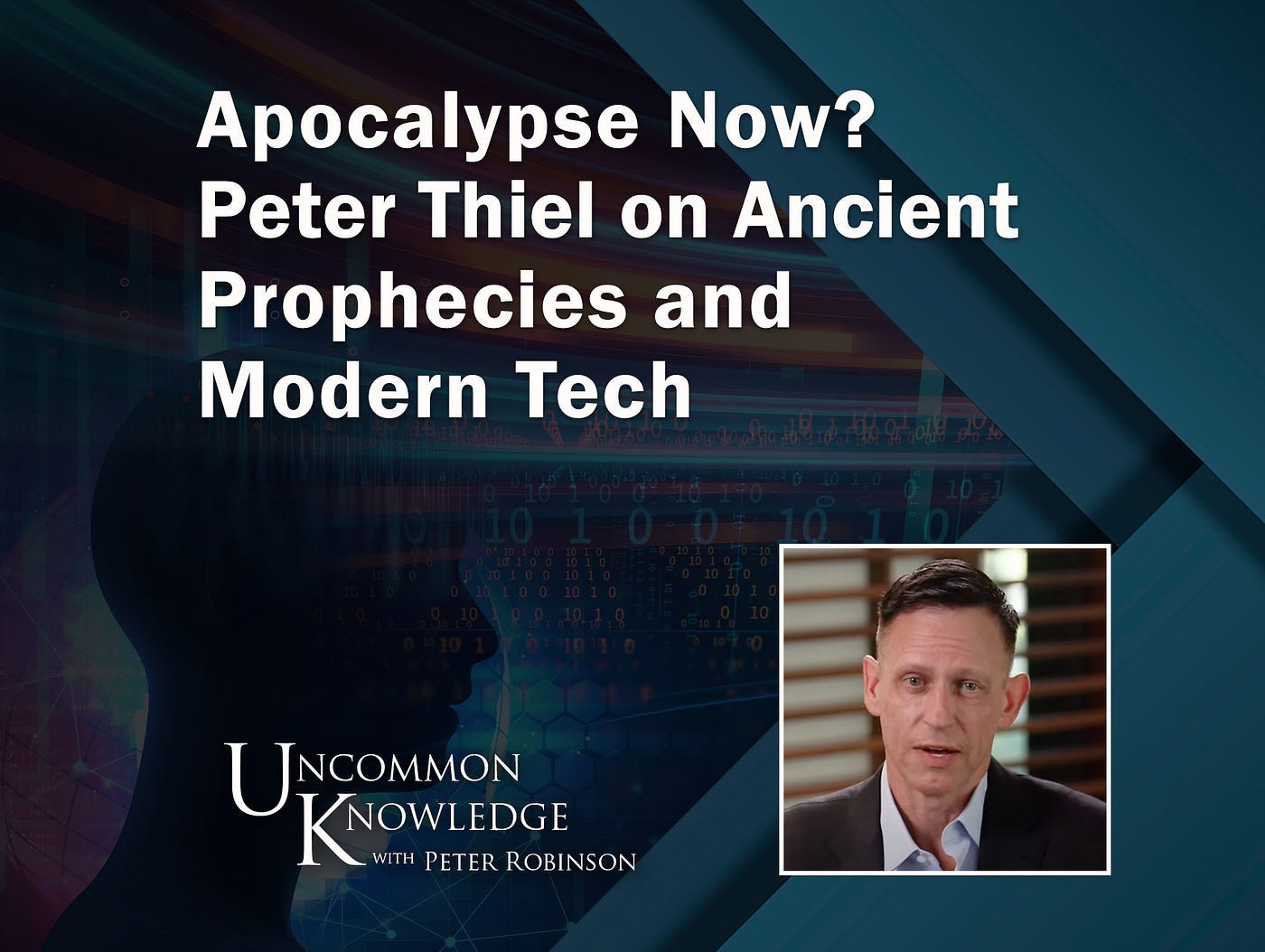
In 2024, Peter Thiel returned to Uncommon Knowledge with Peter Robinson, discussing his views on the end times, technology, and societal progress.

